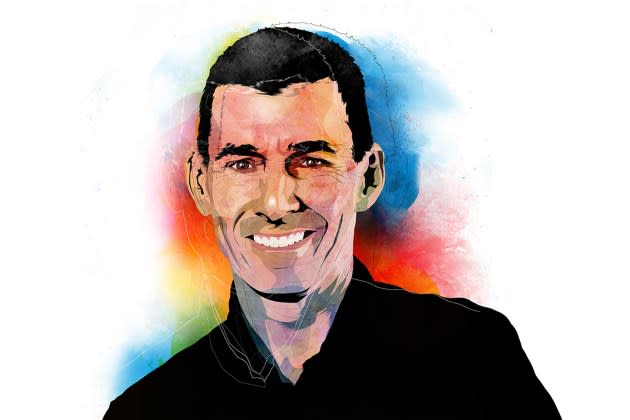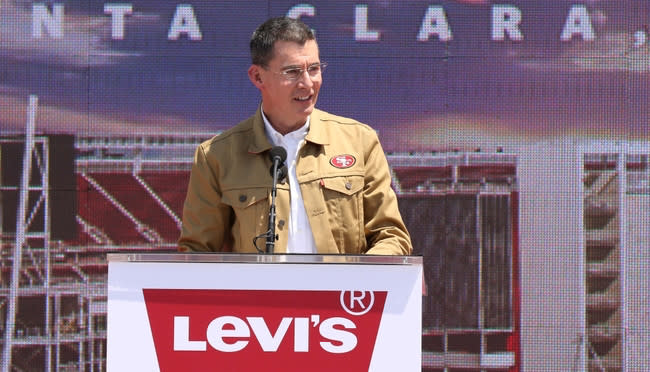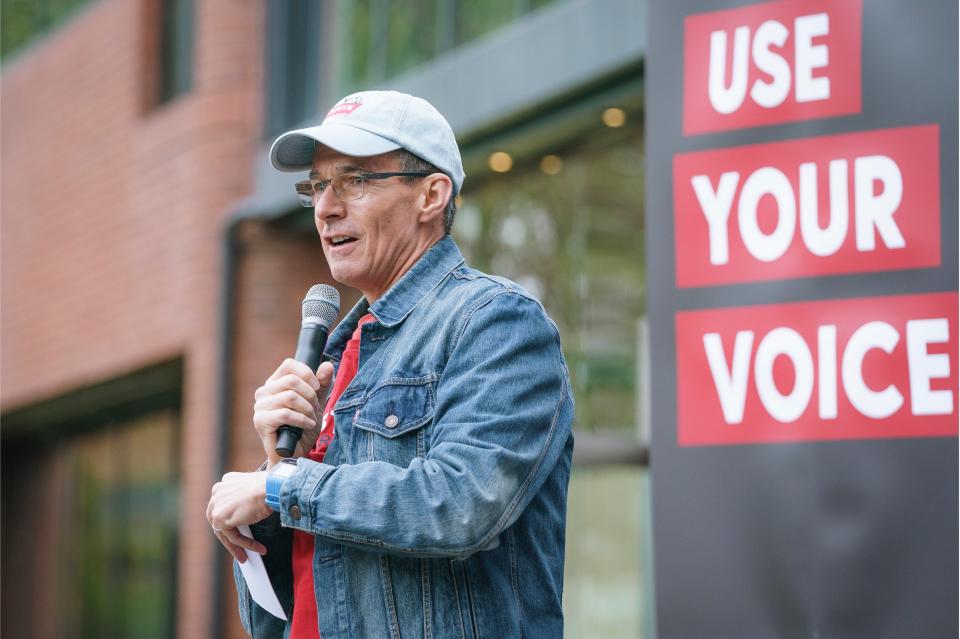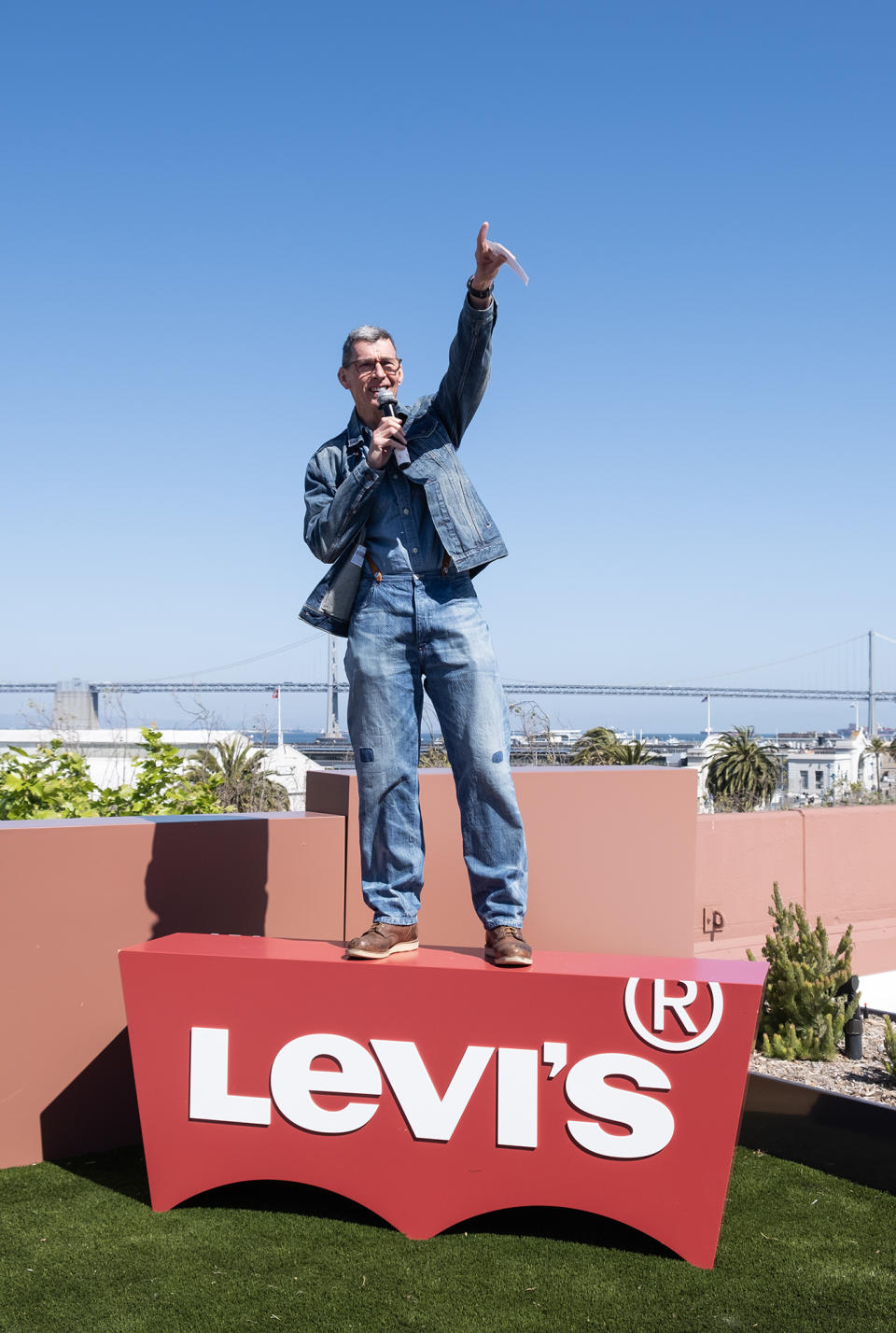Chip Bergh’s Final Word at Levi’s: The CEO Exit Interview

This is a tough time for Chip Bergh, who’s getting ready to walk out of the corner office at Levi Strauss & Co.
“I cry when I watch ‘Frozen,’” the outgoing chief executive officer told WWD in an exit interview. “I am a softy.”
More from WWD
Bergh, 66, spent the last 12-and-a-half years not just running the denim leader — but reimagining the wholesale mainstay as a modern retail machine.
It took force of will, strategic planning and a team.
And to rally that team, Bergh became chief cheerleader. He was relentlessly on message in media interviews, took big stands on social issues and regularly communed with employees over matters large and small, often in meetups called Chips and Beer.
At the final Chips and Beer this month, Bergh was not leading the cheer, but on the receiving end as employees logged in around the world to share their “Chip stories” — from the handwritten note he sent to a store manager to other words of encouragement he gave along the way.
“I was in tears probably at least a half a dozen times in that one hour,” Bergh said. “That’s what’s going to be hard — not being around my team, not being around the people, not having an opportunity to get out into the markets. That’s going to be the toughest part.
“Nobody will ever remember me for the business results,” he said. “They will remember me for what I did for them. And most of the stories were very, very personal stories.”
But the people who don’t know Bergh personally — the competitors looking to chip away at Levi’s number-one spot in denim, the company’s shareholders — are likely going to remember the results.
Bergh joined Levi’s in 2011 after a 28-year run at Procter & Gamble, where he led the $7 billion global man’s grooming business and worked to integrate the Gillette acquisition and turn around Old Spice.
Levi’s had just come off a year when sales tallied $4.4 billion with operating income of $381 million — an old school wholesale brand looking for traction in a new, more direct-to-consumer world.
Now the company is much different, connecting with consumers directly. More than 40 percent of Levi’s business — which includes the namesake brand, but also Dockers and Beyond Yoga — comes from its own stores and websites. The past four quarters produced sales of $6.1 billion with operating profits of $500 million.
Along the way, Levi’s inked a deal that has the San Francisco 49ers playing in “Levi’s Stadium,” staged an IPO on Wall Street, weathered the pandemic and more.

Still, 2023 was a tricky one for the company, and Bergh was quick to take responsibility.
“This past year has been a tough year,” he said. “Some of that has been self-inflicted….We did not execute well the last 18 months or so, and we had these self-inflicted wounds with these supply chain issues. One of my biggest mistakes as I look back on my tenure here was leaning into building inventory back in 2022 when the business was growing double digits and we were facing all kinds of supply chain issues.
“Most of our business here in the U.S. is core carryover product…and it was like, ‘Let’s load up. Let’s make sure we don’t run out of product.’ And we did. And then in mid ‘22, all of a sudden the inflationary signs and interest rates started to creep up and things came to a screeching halt,” he said, with signature straightforwardness that is rare among high-level CEOs, who tend to talk about missteps and weaknesses in jargony roundabouts, at least in public.
It’s a cut-to-the-chase approach the CEO applied to Levi’s from Day One.
“When I arrived at the company, we were operating the company almost as if we were a nonprofit organization,” Bergh said. “The notion of making a profit and making money and growing profitability every year was not something that was embedded in the organization.”
He moved to change that quickly.
Bergh might be a softy, but he’s not a pushover and moved quickly to remake the management team when he took control — of the 11 direct reports he had when he arrived, nine were gone in the first year-and-a-half. (That churn didn’t continue, though, with members of the executive team averaging about nine-year tenures during Bergh’s run at the top.)
“At the end of the day, the role of the CEO fundamentally is…resource allocations. It’s where do you put headcount? Where do you put dollars? Where do you invest? Where do you not invest? What kind of choices do you make with the resources, the capital and human capital that you have available to drive shareholder return? That is fundamentally the job if you get really clinical about it.
“But the reason we’ve been successful is — the other part of being a CEO is unleashing talent and trying to get a 100 or 110 or 120 percent out of everybody,” he said. “Part of the reason we’ve been successful is we’ve had a really highly engaged team who was really motivated and who loved the brand, who loved the company because of what the company stands for in terms of profits through principles and how we operate.”

Levi’s has a long track record of wearing its heart on its sleeve and speaking out on social issues
The company integrated its factory workforce in the ’50s, before desegregation was required in the U.S. It became the first large company to extend health benefits to unmarried domestic partners in 1992.
It’s a tradition Bergh has carried forward in a number of ways, including when he started to speak out against gun violence in 2016, after a shopper accidentally shot himself in the foot trying on a new pair of jeans in a Levi’s store. Bergh received death threats over the issue and, for a time, had unmarked police cars in front of his house for safety.
“We’ve always operated with this notion of we’re here to do more than just make a pair of jeans and sell a pair of jeans,” Bergh said. “We’re here to make a difference in the world. And that goes all the way back to our founder.”
Early on, Bergh sought to link the company’s ability to drive profits with its ability to do good.
“The more successful we became over the last 12 and a half years, the more money we were able to contribute to the [Levi Strauss] Foundation and the more the foundation was able to do and make a difference,” he said.
According to its website, the foundation supports “leaders and organizations fighting for change on the issues and events of our time” and supports four core issues, including reproductive justice, worker rights and well-being, immigrant rights and democracy.
Of course, not every position Levi’s took sat well with every employee and when there were concerns — including from some gun owners — Bergh said he sat down and talked to them.
“The key thing is to listen sincerely, listen to show respect,” he said. “It’s inevitable that any position that is controversial, there’s never going to be 100 percent agreement.”
That gives a glimpse of Bergh’s style at Levi’s.
“The job of leadership at any level, not just the CEO level, is not to be liked,” he said. “The job is to be respected. I’ve seen leaders fail because they want to be so liked. They want to be liked, they try to please everybody and then they don’t stand for anything.”
Bergh said the job of being a CEO has gotten much harder over the past five years or so, from keeping up to technological change to syncing up with culture at large.
“Navigating divisiveness in this country, and really globally for that matter, but navigating some of the geopolitics, it’s become a much more challenging and much more difficult job,” he said.
The CEO also pointed to increasing requirements around sustainability and the divisiveness around the diversity, equity and inclusion efforts in business.
DEI is an area where Bergh acknowledged that he didn’t move quickly enough.
“When I joined the company, the house was on fire,” he said. “Our business was in a terrible place. The brand was broken. We hadn’t consistently grown the top and the bottom line in over a decade.
“The choice that I made — and it was a conscious choice — was that we would not focus on diversity, equity and inclusion or diversity in those early days,” he said. “We had to fix the business. And that was the singular message that I wanted to send to the organization.”
But when the police murder of George Floyd shined a bright light on the state of equality in the country, Bergh didn’t like what he saw at Levi’s.
“It was a reckoning for me in many ways,” he said. “We looked in the mirror and looked at our results, Where do we stand? And I was not proud of where we were and the fact that we had not focused on it; it was clear that we weren’t where we needed to be.”
Bergh took accountability and made DEI a priority. The company now discloses its progress in the area with its second annual report last year showing that representation is increasing for the most part. The top management at Levi’s is made up of 45.2 percent women (up from 42.6 percent a year earlier), 18.6 percent Asian (up from 15.7 percent), 5.7 percent Black (up from 4.7 percent), 9 percent Latine (down from 9.4 percent) and 61.9 percent white (down from 64.9 percent).
“I would say we’ve made really good progress,” Bergh said. “I would not declare victory at this point. I don’t know if you ever get to the final destination, but we continue to work against it. And despite all the hoopla around it, I fundamentally believe that a diverse organization that is much more representative of the consumers who we serve around the world is going to outperform a homogenous one.”
With Bergh’s departure, president Michelle Gass, the former Kohl’s Corp. chief, officially steps up as CEO on Monday. She will, once again, become one of the very few women leading a major publicly traded fashion company. Only 7.4 percent of the Fortune 1,000 companies were led by women CEOs in 2022, according to a study by the Women Business Collaborative and other groups.
Bergh emphasizes Gass’ experience in retail, a growing and vital part of the Levi’s business.
“When we were working on succession, the board was like, ‘Chip, just go find another you,’” he said. “‘We need a mini you.’ And I said to them, ‘I don’t think so. I’m a brand guy. I was what this company needed 12 years ago. We need somebody who is a retailer.’”

But a retailer who knows the ins and outs of Levi’s.
So Bergh spent the last year traveling the world with Gass.
“The transition plan was my top priority this past year, he said. “Nobody could set Michelle up to be successful more than me….She understands the strategy, she knows where the opportunities are, she knows where every bone is buried in the backyard.”
Bergh sounds supremely confident about Gass’ arrival, but is also acutely aware of just how complicated the consumer landscape.
“I worry that somehow we wind up as a company in the crosshairs,” he said. “Not because of anything that Michelle specifically does, but because of who we are as a company; we’ve got this huge iconic American brand. Whether it’s fallout from the war in the Middle East where they go after strong American brands or…something that is outside of our control that is a backlash to who we are and who we are as a company, whether that’s our values and how we take stands on things. That’s my biggest worry.”
Next week, that and the rest of Levi’s business will be Gass’ to worry about.
Bergh is going to find something to keep himself busy elsewhere — after being at home for more than a week during the holidays, he said his wife made clear he’s not just going to be sitting around the house.
That might mean sitting on boards or writing a book or teaching. He wouldn’t rule out another CEO post somewhere, although probably not in apparel.
“I would never want to do something that would compete with Levi’s,” he said.
“I’m not going to work for the next 10 or 15 years,” he said. “So if it’s something that I could do for three years or four years, if there’s something that could be outrageously fun, if it was something where I could create a lot of value, build a team, develop an internal successor, and it kind of met all of those criteria, it might be interesting.”
Wherever the future takes Bergh, it seems like Levi’s — and what happens there now — is going to stay with him.
“My biggest legacy isn’t going to be the turnaround, isn’t going to be Levi’s Stadium, or the IPO, or all these episodic events that we did through the years,” he said. “It is ultimately going to be, ‘Where does the company go the year after, three years after, five years after I’m gone?’”
And that’s why the last year has been about working with Gass as she settled into the Levi’s business.
“Having a ton of confidence in my successor makes it a lot easier to leave,” Bergh said.
But for a big softy like Bergh, it’s still not going to be easy.
Best of WWD

